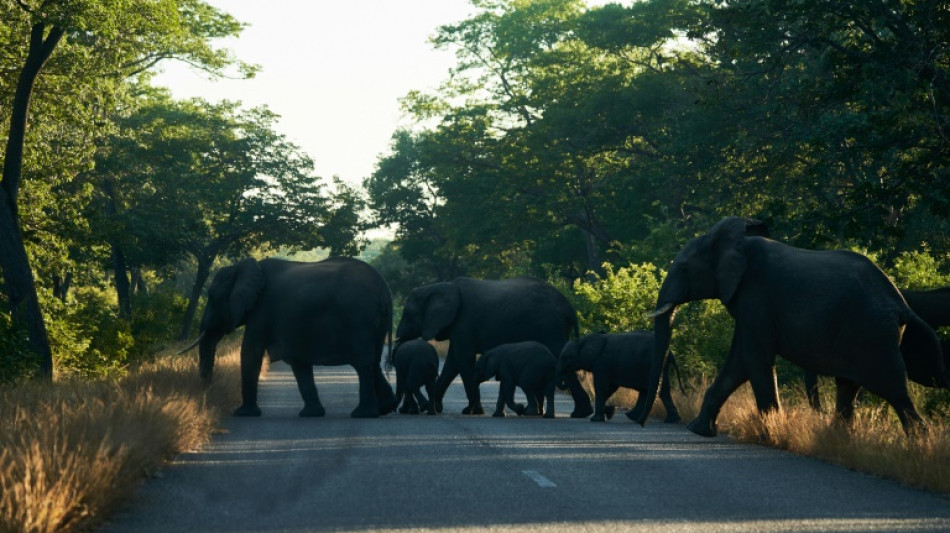
-
 Wales revel in being the underdogs, says skipper Lake
Wales revel in being the underdogs, says skipper Lake
-
German school students rally against army recruitment drive

-
 Wary European states pledge military aid for Cyprus, Gulf
Wary European states pledge military aid for Cyprus, Gulf
-
Liverpool injuries frustrating Slot in tough season

-
 Real Madrid will 'keep fighting' in title race, vows Arbeloa
Real Madrid will 'keep fighting' in title race, vows Arbeloa
-
Australia join South Korea in quarters of Women's Asian Cup

-
 Kane to miss Bayern game against Gladbach with calf knock
Kane to miss Bayern game against Gladbach with calf knock
-
Henman says Raducanu needs more physicality to rise up rankings

-
 France recall fit-again Jalibert to face Scotland
France recall fit-again Jalibert to face Scotland
-
Harry Styles fans head in one direction: to star's home village

-
 Syrian jailed over stabbing at Berlin Holocaust memorial
Syrian jailed over stabbing at Berlin Holocaust memorial
-
Second Iranian ship heading to Sri Lanka after submarine attack

-
 Middle East war spirals as Iran hits Kurds in Iraq
Middle East war spirals as Iran hits Kurds in Iraq
-
Norris hungrier than ever to defend Formula One world title

-
 Fatherhood, sleep, T20 World Cup final: Henry's whirlwind journey
Fatherhood, sleep, T20 World Cup final: Henry's whirlwind journey
-
Conservative Nigerian city sees women drive rickshaw taxis

-
 T20 World Cup hero Allen says New Zealand confidence high for final
T20 World Cup hero Allen says New Zealand confidence high for final
-
The silent struggle of an anti-war woman in Russia

-
 Iran hits Kurdish groups in Iraq as conflict widens
Iran hits Kurdish groups in Iraq as conflict widens
-
China sets lowest growth target in decades as consumption lags

-
 Afghans rally against Pakistan and civilian casualties
Afghans rally against Pakistan and civilian casualties
-
South Korea beat Philippines 3-0 to reach women's quarter-finals

-
 Mercedes' Russell not fazed by being tipped as pre-season favourite
Mercedes' Russell not fazed by being tipped as pre-season favourite
-
Australia beat Taiwan in World Baseball Classic opener

-
 Underdogs Wales could hurt Irish after Scotland display: Popham
Underdogs Wales could hurt Irish after Scotland display: Popham
-
Gilgeous-Alexander rules over Knicks again in Thunder win

-
 Hamilton reveals sequel in the works to blockbuster 'F1: The Movie'
Hamilton reveals sequel in the works to blockbuster 'F1: The Movie'
-
Alonso, Stroll fear 'permanent nerve damage' from vibrating Aston Martin

-
 China boosts military spending with eyes on US, Taiwan
China boosts military spending with eyes on US, Taiwan
-
Seoul leads rebound across Asian stocks, oil extends gains

-
 Tourism on hold as Middle East war casts uncertainty
Tourism on hold as Middle East war casts uncertainty
-
Bayern and Kane gambling with house money as Gladbach come to town

-
 Turkey invests in foreign legion to deliver LA Olympics gold
Turkey invests in foreign legion to deliver LA Olympics gold
-
Galthie's France blessed with unprecedented talent: Saint-Andre

-
 Voice coach to the stars says Aussie actors nail tricky accents
Voice coach to the stars says Aussie actors nail tricky accents
-
Rahm rejection of DP World Tour deal 'a shame' - McIlroy

-
 Israel keeps up Lebanon strikes as ground forces advance
Israel keeps up Lebanon strikes as ground forces advance
-
China prioritises energy and diplomacy over Iran support

-
 Canada PM Carney says can't rule out military participation in Iran war
Canada PM Carney says can't rule out military participation in Iran war
-
Verstappen says new Red Bull car gave him 'goosebumps'

-
 Swiss to vote on creating giant 'climate fund'
Swiss to vote on creating giant 'climate fund'
-
Google to open German centre for 'AI development'

-
 Winter Paralympics to start with icy blast as Ukraine lead ceremony boycott
Winter Paralympics to start with icy blast as Ukraine lead ceremony boycott
-
Sci-fi without AI: Oscar nominated 'Arco' director prefers human touch

-
 Ex-guerrillas battle low support in Colombia election
Ex-guerrillas battle low support in Colombia election
-
'She's coming back': Djokovic predicts Serena return

-
 Hamilton vows 'no holding back' in his 20th Formula One season
Hamilton vows 'no holding back' in his 20th Formula One season
-
Two-thirds of Cuba, including Havana, hit by blackout

-
 US sinks Iranian warship off Sri Lanka as war spreads
US sinks Iranian warship off Sri Lanka as war spreads
-
U.S. Polo Assn. Expands Collegiate Partnership Program to Record 70 Teams for 2026 Season


Zimbabwe's ballooning jumbo herds a growing threat to humans
Seventy-five-year-old Hanganani Gideon Dube has walked with a slight limp and his speech been laboured since he miraculously survived being trampled by an elephant in northwestern Zimbabwe.
He considers himself lucky to be alive following the assault one afternoon in May 2021 near Mabale village on the outskirts of Hwange National Park, the country's biggest.
But the injuries have left him unable to fend for his family of six.
Dube was tending his cattle when "suddenly I found myself face-to-face with an elephant".
He sprinted off, without realising he was running straight into the path of another elephant.
"There was no time for me to evade the second elephant. It attacked me swiftly and I blacked out," he said in the local Ndebele language.
Dube said he's still puzzled "why the elephant didn't finish me off".
"I am lucky to be alive but I am now useless as I can no longer do any physical work, including looking after my cattle," he said sitting on a stool by a cooking fire at his homestead.
At least 60 people have been killed by elephants in Zimbabwe since the start of the year, compared with 72 over all of 2021 year.
Zimbabwe's conservation success story has had unfortunate side-effect of heightening jumbo-human conflict.
With some 100,000 elephants, Zimbabwe has the world's second-largest population after Botswana, and about one-quarter of the elephants in all of Africa.
More than half of those pachyderms live in and outside the unfenced Hwange, a wildlife park nearly half the size of Belgium, some 14,600 square kilometres (5,637 square miles) of vegetation.
Elephants roam freely from Zimbabwe's sprawling and unfenced game reserves and it is common to find herds crossing or resting along the main highway from Hwange to the nearby prime tourist resort of Victoria Falls.
- 'Reward not punishment' -
Zimbabwe's elephant population is growing at about five percent a year, reaching unsustainable levels.
"Our conservation methods are working and I believe that instead of being punished we should be rewarded," Fulton Mangwanya, the Zimbabwe Parks and Wildlife Management Authority director told AFP.
He spoke on the sidelines of a conference in Hwange where the government is this week lobbying allies to push for legal ivory trade.
Zimbabwe, along with Botswana, Namibia and Zambia, wants the UN Convention on International Trade Endangered Species of Wild Fauna and Flora, commonly referred to as CITES, to lift the ban on the trade in ivory.
They argue that scrapping the ban can help to better preserve the animals and bring economic benefit to local communities who live close to the animals.
Zimbabwe has a huge $600-million stockpile of ivory which it recently showed to ambassadors representing various countries including the European Union, China and Japan. It has urged EU diplomats to allow a one-off sale of the ivory.
The country's last official elephant census in 2014 counted more than 80,000, a figure now estimated at 100,000, which authorities say is three times more than capacity.
But some conservationists doubt the accuracy of the statistics and fear that lifting the trade ban would pose a threat to elephant populations.
America, along with EU countries and Britain remain opposed to lifting the ban while China and Japan are some of the countries in support.
International trade in ivory and elephants has been banned since 1989 under the CITES. One-off sales were allowed in 1999 and 2008, despite fierce opposition.
The Harare government has threatened to pull out of the convention if it doesn't have its way on ivory trading.
S.Keller--BTB




